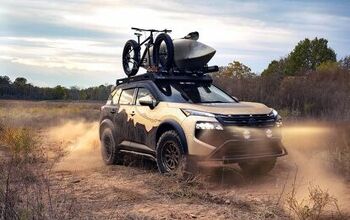While American Automakers Want Japan To Abandon Kei Cars, Matt Blunt Won't Release The Documents, Again

For a long time, Japan’s automakers had pressured their government to enter free trade talks with Europe and the U.S. The Japanese government had dragged its heels, putting the interest of ageing farmers first. With a trade agreement, Japan would be a ripe market for American rice farmers and cattle breeders, and I would finally be able to enjoy a good steak in Japan without risking a heart attack. Caused by the price, not by the cholesterol.
After the Japanese car industry did flee the strong yen and the country, its government reluctantly entered negotiations. Not surprisingly, the American car industry is opposed.
When Japan announced its intentions to join the Trans-Pacific Partnership (TPP) negotiations, U.S. car companies represented by the American Automotive Policy Council (AAPC) expressed “adamant opposition,” Inside U.S. Trade reported. The AAPC represents Ford, Chrysler, and GM. Last November, AAPC President Matt Blunt demanded that Japan should not be allowed to join the TPP negotiations until U.S. and other foreign cars have achieved a higher market share in Japan. Which is a crafty way of saying “never.”
Now, the AAPC found another straw man argument. Japan should give up its beloved kei cars. Or rather the preferential tax treatment of the pint sized cars.
“Japan’s ‘Kei’ super-mini car segment has consistently represented over 30 percent of the auto market, but no longer has a clear policy rationale to be provided preferential treatment,” the AAPC wrote in an opinion paper submitted to the U.S. Trade Representative. Imagine the uproar it would cause if a foreign trade organization would dare to doubt the policy rationale behind preferential treatment of the American pick-up. There is nothing that precludes the importation of foreign kei cars to Japan. If there would be foreign kei cars.
Of course it would be more honest to say: “Look, 2.5 percent import duty on foreign cars brought to the U.S. is low enough, who wants zero like in Japan. We want to keep that tariff. We especially want to keep the 25 percent chicken tax on trucks that worked so well. Exports to Japan? Are you kidding me?” That would be honest, but honesty does not get you far in politics.
Nobody knows that better than the former governor of Missouri Blunt, who did not run for re-election after one term, rocked by scandals. He chose a career in lobbying, which got him the job as AAPC president last year. Blunt riles against non-tariff barriers that unfairly prevent the success of American cars in Japan, but Blunt is hard pressed to name the barriers when asked what they are.
In an interview with Inside U.S. Trade, Blunt said that the AAPC will not develop an exact list of barriers its members face in Japan. Blunt said that would be a “classic whack-a-mole” approach under which the United States would seek to address one barrier only to have another one pop up.
Come on, Matt Blunt. Release the documents.
Meanwhile, the AAPC “is fully supportive of the ambition of a 21st century TPP agreement with Australia, Brunei, Chile, New Zealand, Malaysia, Peru, Singapore and Vietnam.” No wonder, they don’t have much of a car industry.
In the unlikely case that Japan should succeed with that TPP business in an election year, Blunt could always declare an emergency and shoot them.

Bertel Schmitt comes back to journalism after taking a 35 year break in advertising and marketing. He ran and owned advertising agencies in Duesseldorf, Germany, and New York City. Volkswagen A.G. was Bertel's most important corporate account. Schmitt's advertising and marketing career touched many corners of the industry with a special focus on automotive products and services. Since 2004, he lives in Japan and China with his wife <a href="http://www.tomokoandbertel.com"> Tomoko </a>. Bertel Schmitt is a founding board member of the <a href="http://www.offshoresuperseries.com"> Offshore Super Series </a>, an American offshore powerboat racing organization. He is co-owner of the racing team Typhoon.
More by Bertel Schmitt
Latest Car Reviews
Read moreLatest Product Reviews
Read moreRecent Comments
- ToolGuy TG likes price reductions.
- ToolGuy I could go for a Mustang with a Subaru powertrain. (Maybe some additional ground clearance.)
- ToolGuy Does Tim Healey care about TTAC? 😉
- ToolGuy I am slashing my food budget by 1%.
- ToolGuy TG grows skeptical about his government protecting him from bad decisions.

































Comments
Join the conversation
Perhaps we could drop the subsidies for electrics in exchange, up to and including the $1.4 billion subsidy of Nissan's US Leaf and battery plant which is supposed to create 1,300 jobs at 1.1 million a piece when US Leaf demand reaches 150,000 a year.
California short grain rice, grown with the Asian market in mind is pretty good. My Japanese wife has no problem with a couple of the specialty brands. Her sister in Japan is absolutely convinced fhat American rice is distinctly inferior, but it's really a psychological bias - sort of along the lines of the old Coke/Pepsi thing As for the car barriers, they're also psychological any more and not at all governmental or business based. My theory is this: the American unions complained loudly in the 80's about Japanese cars, even going as far as holding sledge-hammer car beating parties; the kind of stuff that makes great news clips. These were shown widely in Japan followed, of course, by commentary about the trash-quality of American cars. Such turnabout is fair play particularly when true. This left a well-earned quality bias against American cars compounding the bias that already existed because American cars were big and flashy -so big as to be blatently impractical. Recall that in Japan, "the nail that sticks up gets hamered down" so, only gangsters and such types drove them. Of course, being left-hand drive didn't help either. As for kei class cars, I don't see any way that an American company could build a kei - even overseas - that could find an unfilled niche in the Japanese market.